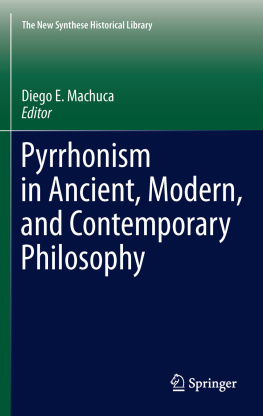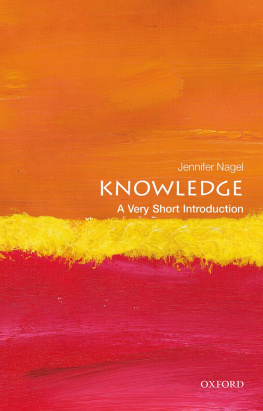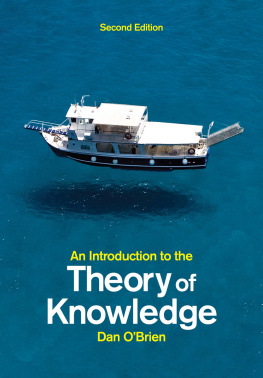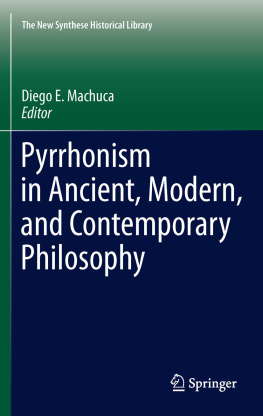
Fogelin, Robert J. Professor of Philosophy and Sherman Fairchild Professor in the Humanities, Dartmouth College, New Hampshire
Pyrrhonian Reflections on Knowledge and Justification
Publication date 1994 (this edition)
Print ISBN-10: 0-19-508987-1
Print ISBN-13: 978-0-19-508987-5
doi:10.1093/0195089871.001.0001
Abstract: This work addresses the following question: What would be the consequence of allowing a representative of ancient Pyrrhonian scepticism to become a party to contemporary debates in theory of knowledge? The conclusion of this work is that most of our contemporary epistemologists would fare badly in this encounter.Part 1 concerns the analysis of knowledge claims. It defends the almost universally rejected view that knowledge is simply justified true belief. This analysis is generally thought to be untenable because it yields skepticism or Gettier problems (or both). In response, it is argued that everyday knowledge claims are protected from both difficulties by placing limits on the level of scrutiny, that is, limits are placed on the range of possible defeators that are taken seriously. Conversely, when these constraints are set aside, as epistemologists often do, skepticism and Gettier problems understandably arise. Three chapters are dedicated to examining and criticizing alternative analyses of knowledge claims: various fourth-clause analyses, externalist analyses, and subjunctive (possible-world) analyses.Part 2 concerns theories of justification. It presents a confrontation between Agrippa's Five Modes Leading to the Suspension of Belief (as found in Sextus Empiricus's Outlines of Pyrrhonism) and three contemporary theories of justification: Chisholm's foundationalist theory, BonJour's internal coherentism, and Davidson's external coherentism. The conclusion of this examination is that none of these accounts of justification makes serious headway in responding to Agrippa's Five Modes.
Keywords: Agrippa,Laurence BonJour,Roderick Chisholm,coherentism,Donald Davidson,foundationalism,Gettier problem,justification,knowledge,Pyrrhonism,Sextus Empiricus,skepticism
Pyrrhonian Reflections on Knowledge and Justification
end p.i
end p.ii
Pyrrhonian Reflections on Knowledge and Justification
New York Oxford
1994
end p.iii

198 Madison Avenue, New York, New York 10016
Oxford University Press is a department of the University of Oxford
It furthers the University's objective of excellence in research, scholarship,
and education by publishing worldwide in
Oxford New York
Auckland Bangkok Buenos Aires Cape Town Chennai
Dar es Salaam Delhi Hong Kong Istanbul Karachi Kolkata
Kuala Lumpur Madrid Melbourne Mexico City Mumbai Nairobi
So Paulo Shanghai Taipei Tokyo Toronto
Oxford is a registered trade mark of Oxford University Press
in the UK and in certain other countries
Copyright 1994 by Robert J. Fogelin
The moral rights of the authors have been asserted
Database right Oxford University Press (maker)
All rights reserved. No part of this publication may be reproduced,
stored in a retrieval system, or transmitted, in any form or by any means,
without the prior permission in writing of Oxford University Press,
or as expressly permitted by law, or under terms agreed with the appropriate
reprographics rights organization. Enquiries concerning reproduction
outside the scope of the above should be sent to the Rights Department,
Oxford University Press, at the address above
You must not circulate this book in any other binding or cover
and you must impose this same condition on any acquirer
Library of Congress Cataloging-in-Publication Data
Fogelin, Robert J.
Pyrrhonian reflections on knowledge and justification.
p. cm.
Includes bibliographical references and index.
ISBN 0-19-508987-1
1. Justification (Theory of knowledge) 2. Skepticism.
BD212.F64 1994
121dc20 93-40068
end p.iv
end p.vi
Preface
Some of the thoughts in this work have been with me a long time. Forerunners of my present ideas about knowledge appeared first in Evidence and Meaning (1967), and much that I said there still strikes me as broadly correct. What that earlier treatment lacked was an appreciation of the complexity and depth of the problems it was intended to solve.
At that time I was much under the influence of the writings of J. L. Austin, and I thought philosophical problems could be resolved in reasonably short order through paying careful attention to how words are actually used. I still think valuable insights can be gained in this way and have no desire to join those who now look back at Austin's work with something close to contempt. I moved away from Austin's viewsor what I took to be Austin's viewsfor a number of reasons. Paul Grice's "Causal Theory of Perception" convinced me that Austin's treatment, and hence my treatment, of the problem of perception were wholly inadequate. Studying the works of ancient and modern skeptics convinced me that skeptical challenges are serious challenges. I came to see that these challenges could not be written off with the glib suggestion, common in the 1950s and 1960s, that they result from the skeptic's imposing arbitrary and impossibly high standards for what we can know. My views on these matters were given a considerable boost by hearing, then reading, Thompson Clarke's "Legacy of Skepticism." Immersing myself in the works of Wittgenstein cured me of any lingering idea that philosophical problems admit of easy solutions. Philosophyincluding philosophy intended to abolish philosophyis hard work.
I cannot thank all who have made important contributions to this work, for they include those who have been generous in commenting on my previous writings. I'll limit myself to those institutions and persons who contributed directly to this project.
end p.vii
Institutions first. Though it may not be obvious from its contents, this work was written at a series of pleasantand almost invariably sunnyplaces. It was begun in Stanford, California, at the Center for Advanced Studies in the Behavioral Sciences, where I received partial support from the National Endowment for the Humanities. Most of Part I of this work was written in these ideal surroundings. Two years later I was a visiting professor at the University of California at Berkeley, where I offered a seminar to a group of very intelligent graduate students. This enabled me to test my ideas before they had hardened into unshakable commitments. I had hoped to bring the project to completion during a five-week stay at the Rockefeller Center in the Villa Serbelloni, in Bellagio, Italy, but instead I convinced myself that the work needed two additional chapters. The project was essentially finished in the spring of 1992 while I was on sabbatical, living in a Tuscan farmhouse south of Siena.
Of course, none of this would have been possible without the aid of Dartmouth College and its Department of Philosophy. Both have been understanding and flexible in allowing me to take advantage of the opportunities just noted. The college has also supported my research through sabbaticals, supplementary grants, general research funds, and funds associated with the Sherman Fairchild Professorship in the Humanities, which I hold. For more than a decade, Dartmouth College has provided an ideal setting for the dual occupation of teacher and scholar.












